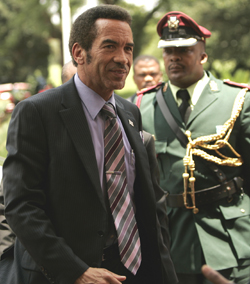For Batswana journalists, news that their South African colleagues are busy warding off a proposed statutory media tribunal from the ruling African National Congress sounds all too familiar. For more than a decade, the government of Botswana has been trying to push a media law that would effectively shift the whole media under state control.
This was eventually achieved as in December 2008, the Media Practitioners Act came to being after being pushed through parliament by the dominant ruling Botswana Democratic party. The implementation of the act has however been frustrated by fierce advocacy by Botswana media groups, with the key assistance of the Law Society of Botswana, which also refused to participate in the implementation as required.
Wrapped in a sheep’s skin of general principles guaranteeing the operational independence of the media and the creation of a statutory press council that “shall be wholly independent and separate from the government, any political party or any other body,” the act reveals in its fine print to have glaring contradictions. It calls for the creation of a new Media Council, whose key committees would operate under the exclusive control of the minister of communication, a political appointee. The latter has wide discretion to handpick the members of the complaints and appeals committees and can dismiss the members of the executive branch. Also problematic is a draconian registration and accreditation regime reminiscent of the one enforced in Zimbabwe until recently, as any publisher not registered by the Media Council could be fined as much as P5,000 (US$781) or face up to three months in jail.
This is despite the fact that, just like in South Africa, Botswana currently has a self-regulatory Press Council that has been operating since 2002. The council has a code of ethics for journalists and takes complaints from the public regarding the media. And the public, especially politicians, take advantage of civil defamation laws.
It was in this context that, on August 13, a motley set of 32 individuals and groups representing media houses, NGOs, and trade unions filed a lawsuit challenging the constitutionality of the law. Supported by the Southern African Litigation Centre and the Media Institute of Southern Africa, the litigation is led by the well-experienced local attorney Dick Bayford and the South African advocate Steven Budlender.
The involvement of Botswana civil society has underscored the value of the free flow of information to sections of the society other than the press. For instance, United Congregational Church of southern Africa, a big church in the Southern African Development Community (SADC) region and one of the oldest in the country, counts among its congregation both prominent members of society and rural folks who mingle together in prayer. In a letter of solidarity the church, through its secretary general, Rev. Prince Dibeela, offered its unequivocal support to the court case as they view the act as a “draconian move that seeks to clamp down on civil liberties of people of Botswana.” Similarly, Andrew Motsamai, representing Botswana Federation of Public Sector Unions, expressed the fear that as trade unionists, they would be required to register in order to write articles for newspapers. The Botswana Network on Ethics, Law, and HIV & AIDS expressed fears that the act might compromise their efforts in on HIV and AIDS advocacy–since it is already going to limit access to information. They decried the fact that the country already does not have a law that guarantees access to information.
Generally regarded as one of the most sensible governments in the SADC region, let alone the continent, Botswana’s seemingly sudden departure from universal democratic practices is not so sudden after all. Signs of suppression have always been there, as evidenced by a series of deportations of journalists and human rights activists over time. Just like his predecessors, President Ian Khama has increasingly become uncomfortable with the media.
His distaste of the media first came to light when while an army commander, when he supposedly banned the distribution of the Botswana Gazette at the army barracks. Khama was quoted in the media at the time as having proclaimed that he does not read local newspapers. On his ascendancy to the throne in April 2008, his first pronouncement about the media was wedged somewhere between the country’s other social ills, such as alcoholism. It was therefore not totally surprising when after a few months into the administration, in December 2008, the government finally enacted a bill known as the Media Practitioners Act that was a result of a decade’s heavy debate. For someone who has never held a single press conference in office, Khama has the ball is in his court to prove his detractors wrong.
What has lately come to the fore is that this political attitude toward the media is not unique to Botswana, but is fast spreading in the SADC region. The biggest surprise, besides Botswana, has been South Africa where the media is furiously fighting for its life. What is apparent though, is that unlike the rest of the media in the region, the affluence of the South African press gives it the strength to fight the government head on.
I would argue that the current situation deserves a regional approach. South African media will not enjoy their freedom and good constitution as long as their leaders share notes with others whose views of these rights are questionable. It is therefore imperative that with its influence in world matters, the South African media start being responsive to regional challenges.
